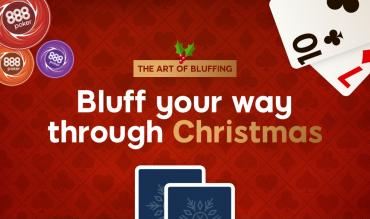The art of bluffing is an essential part of any solid poker player’s game. Poker requires each player to not only try and guess what hands other people at the table are holding, but to regularly try and convince those other players that their own hand is much stronger or weaker than it actually is. In poker, the aim of bluffing is typically to get other players to fold, in order to win the pot without having to show your cards. If you suspect another player is bluffing when you have a semi-solid hand, chances are you will win the pot if you are brave enough to stay in it. Professional poker players spend a lot of time studying body language and working out how to spot “tells” – signs that another player is bluffing. When you learn what to look for, you can also take steps to reduce your own tells when it’s your turn to bluff.
Bluff your way through Christmas
With the festive season almost here, many of us will be looking forward to spending time with family and friends. Many of us, however, will also be dreading those little awkward moments that naturally occur – from smiling when we receive unwanted gifts to keeping up friendly chatter with the in-laws over dinner, there are times when the art of bluffing is just as essential for maintaining good relationships as it is for playing poker. If you find yourself having less fun than expected over Christmas, put on your best poker face and keep the peace! We spoke to our brand ambassador Ian Simpson and asked him to share some of his top tips for practicing the art of bluffing.
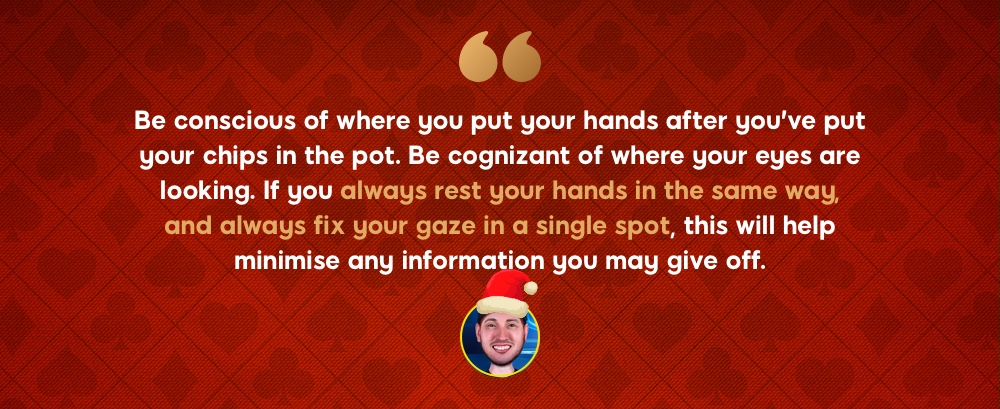
The wrong present?
Imagine the scenario: you’ve been dropping hints for weeks about a necklace you’ve seen that you love. Come Christmas morning, you spot a long, narrow package under the tree addressed to you – exciting! You open it with eager anticipation, only to find a box of fancy pencils inside the silvery paper. Your face drops, and your loved one sees your disappointment – the rest of Christmas is filled with tense, awkwardly polite moments and you both feel terrible. This is where the art of bluffing comes in!
Poker players train themselves not to react when they see the cards they’ve been dealt, so other players can’t tell if they have a good hand or a bad hand. This poker face is exactly what you need when you start ripping off that wrapping paper. No matter what it contains, the best thing for maintaining peace throughout the celebrations is for everyone to feel appreciated. After all, just because it’s not the exact gift you wanted, that doesn’t mean there wasn’t a lot of thought, time and effort put into choosing and sourcing your gift.
Ian Simpson says: “At the poker tables the best way to hide the strength of your holding is to act consistently whilst involved in a hand. Be conscious of where you put your hands after you've put your chips in the pot. Be cognizant of where your eyes are looking. If you always rest your hands in the same way, and always fix your gaze in a single spot, this will help minimise any information you may give off.”
How to put on your poker face
· Relax your face – take deep breaths and try to relax your jaw before opening any gifts, with your lips together.
· Maintain eye contact – show the giver you have nothing to hide, but remember to blink occasionally, otherwise you’re just staring!
· Don’t forget body language – maintain a relaxed posture and avoid fidgeting behaviours such as scratching or playing with your hair.
· Keep your voice balanced and even when you say thank you, keep your words simple and few, and take a full breath before you speak to avoid sounding unnaturally high-pitched.
If you can get your poker face on, you can hopefully avoid any rows around the fireside over the festive period – and you can always treat yourself to that necklace in the January sales, after all!
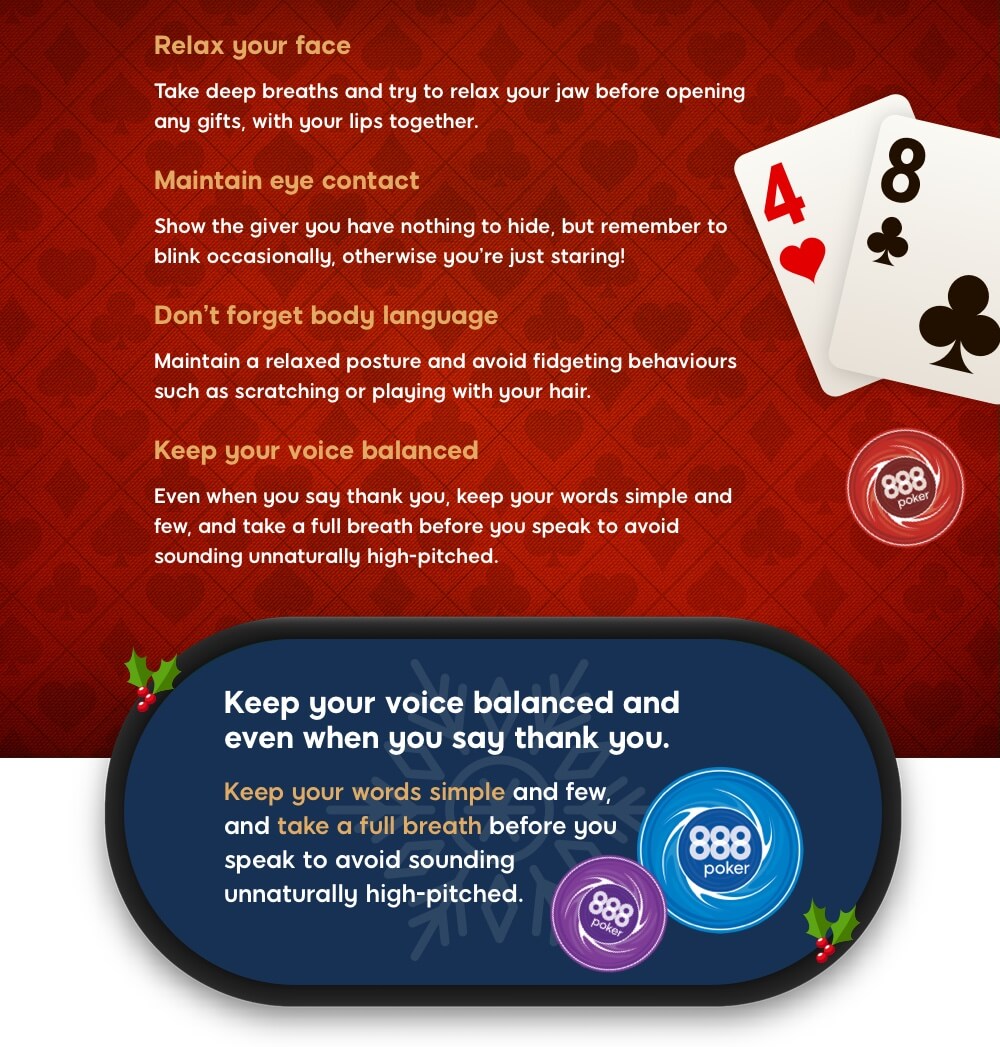
Ian Simpson says: “If you hide that you got a bad gift, you run the risk of getting another bad gift next Christmas! That being said, if you want to protect someone’s feelings then as well as smiling and saying thank you upon receipt of the gift, make sure your gift giver sees you using your gift in the future. Flash them your naff socks the next time you see them to reassure them that it was a nice gift. Just be prepared to get another pair next year!”
The office party
No matter how well we get along with our co-workers, the office Christmas party is often one of the most excruciating events of the year. Being forced to socialise with people we would normally only interact with professionally can end in disaster, especially when you throw cheap booze into the mix. If you find yourself standing around drinking warm white wine out of a paper cup and wishing you were elsewhere, why not try the art of bluffing to get yourself through the evening? It’s good practice for the poker table, and you might find that if you fake it well enough, you start to enjoy yourself more!
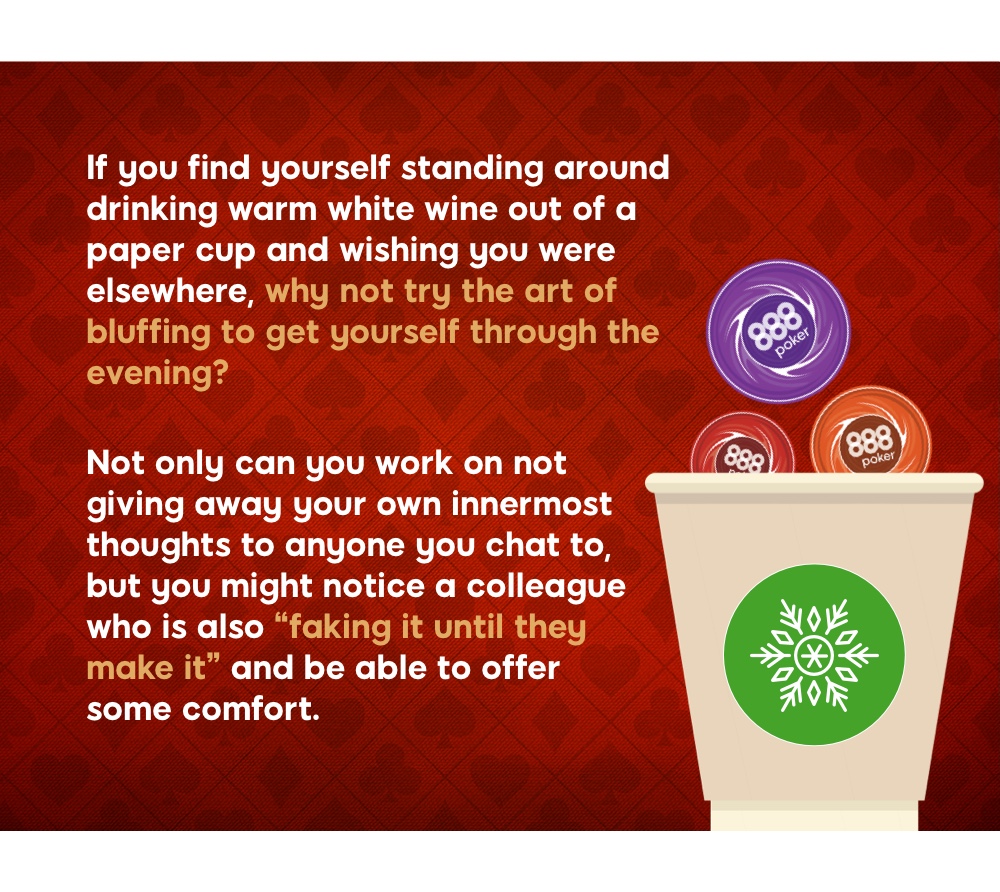
How to avoid giving yourself away
If you want to act like you’re having the best time in the world when really, you would much rather be tucked up in front of the telly in your pyjamas with a cup of hot cocoa, then you need to work on your tells. Not only can you work on not giving away your own innermost thoughts to anyone you chat to, but you might notice a colleague who is also “faking it until they make it” and be able to offer some comfort.
Ian Simpson says: “Live tells largely have to be correlated to the individual for them to be of any value. One person talking a lot all of a sudden during a hand may indicate strength, whilst in another person it might indicate weakness. You've got to observe your opponent and associate their action with the strength of their hand before you can reliably utilise most tells.”
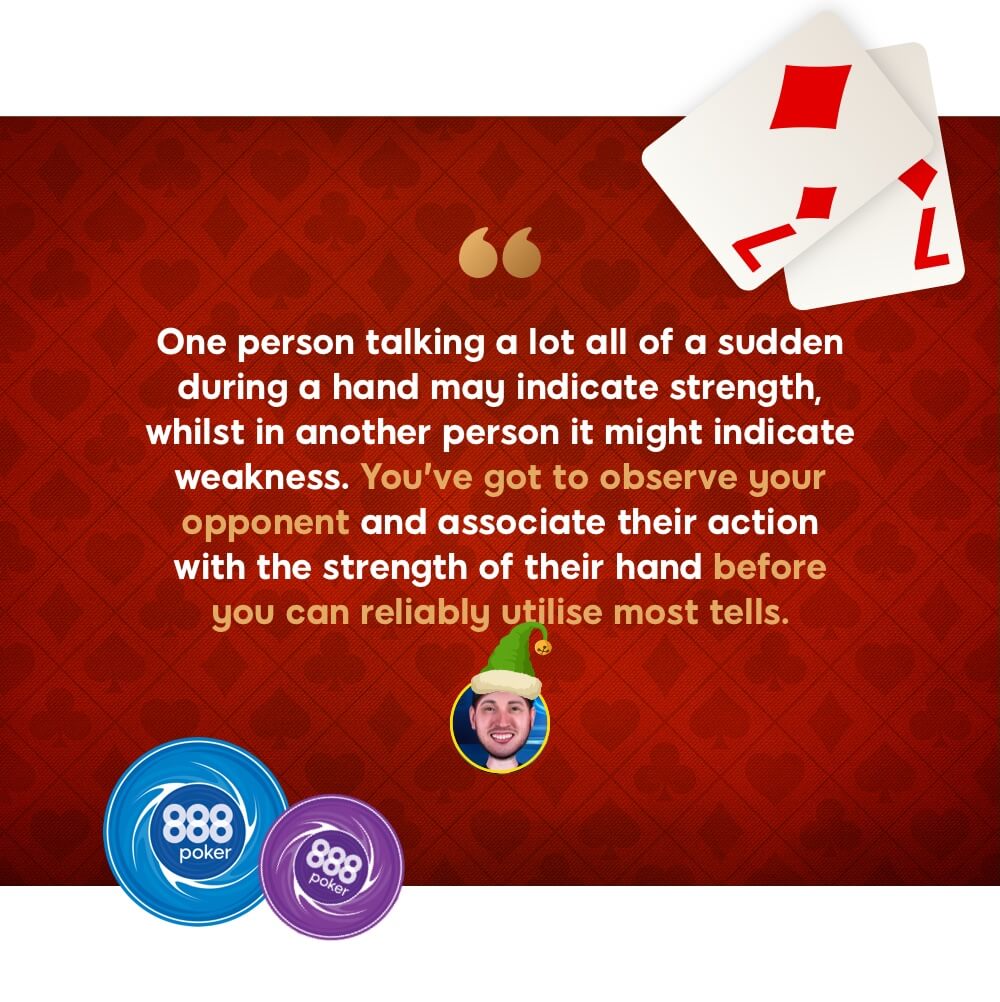
Top poker tells
· Self-soothing – behaviours such as rubbing your own arms or cheeks are often a sign of distress. If you spot a co-worker self-soothing, they might need some extra reassurance.
· Posture – when a beginner poker player is dealt a good starting hand, they will often lean in with excitement. If you need to pretend to be interested in a colleague’s Christmas party joke or show interest in a story about someone’s cat (that you’ve already heard three times), lean towards them as they speak and keep your posture open. Even if you’re not paying attention, they will think you’re fascinated.
· Overcompensation – when first learning to bluff in poker, most novice poker player will act the opposite to the strength of their hand. They might put on a bored expression when they have a good hand, or aggressively throw chips into the pot when bluffing. Similarly, if you’re chatting to a co-worker at the office party who is unnecessarily standoffish or abrasive in their remarks, remember they might be using this behaviour as a mask to hide their insecurities, so give them a break.
· Speech patterns – many poker players aim to speak as little as possible during a poker game, as they know how hard it is to maintain regular speech patterns when under stress. In real life, when we lie, we often naturally slip into speech patterns that are more formal than usual. Try to use contractions, such as “didn’t” rather than “did not” and keep your words simple if you’re lying to a co-worker about how interested you are in their plans for the upcoming holidays.
· Eye movements – when we’re uncomfortable, our eyes can often be the thing that gives us away. When lying or under stress, people are less likely to make eye contact, may blink more often or rapidly change direction of gaze. Try looking people in the eye as you chat to show you care.
· Timing – experienced poker players often take their time over every decision, even when they know exactly what to do, so they don’t give themselves away. In conversation, timing tells often crop up in terms of speech speed. If the person you’re chatting to is nervous, excited or perhaps just had a little too much caffeine, they will talk quickly. If the person you’re chatting to is talking more slowly than usual, it’s pretty safe to assume they are either tired or bored – perhaps move on and chat to someone else!
· Adrenaline – situations of emotional intensity cause our bodies to release adrenaline. This can lead to physical tells, such as the jitters, dilated pupils and a pulsing of neck veins. Some pro poker players wear scarves when they play to avoid giving away these signals. If you’re nervous about attending your office Christmas party, you might want to add a scarf to your outfit too, so you don’t give it away.
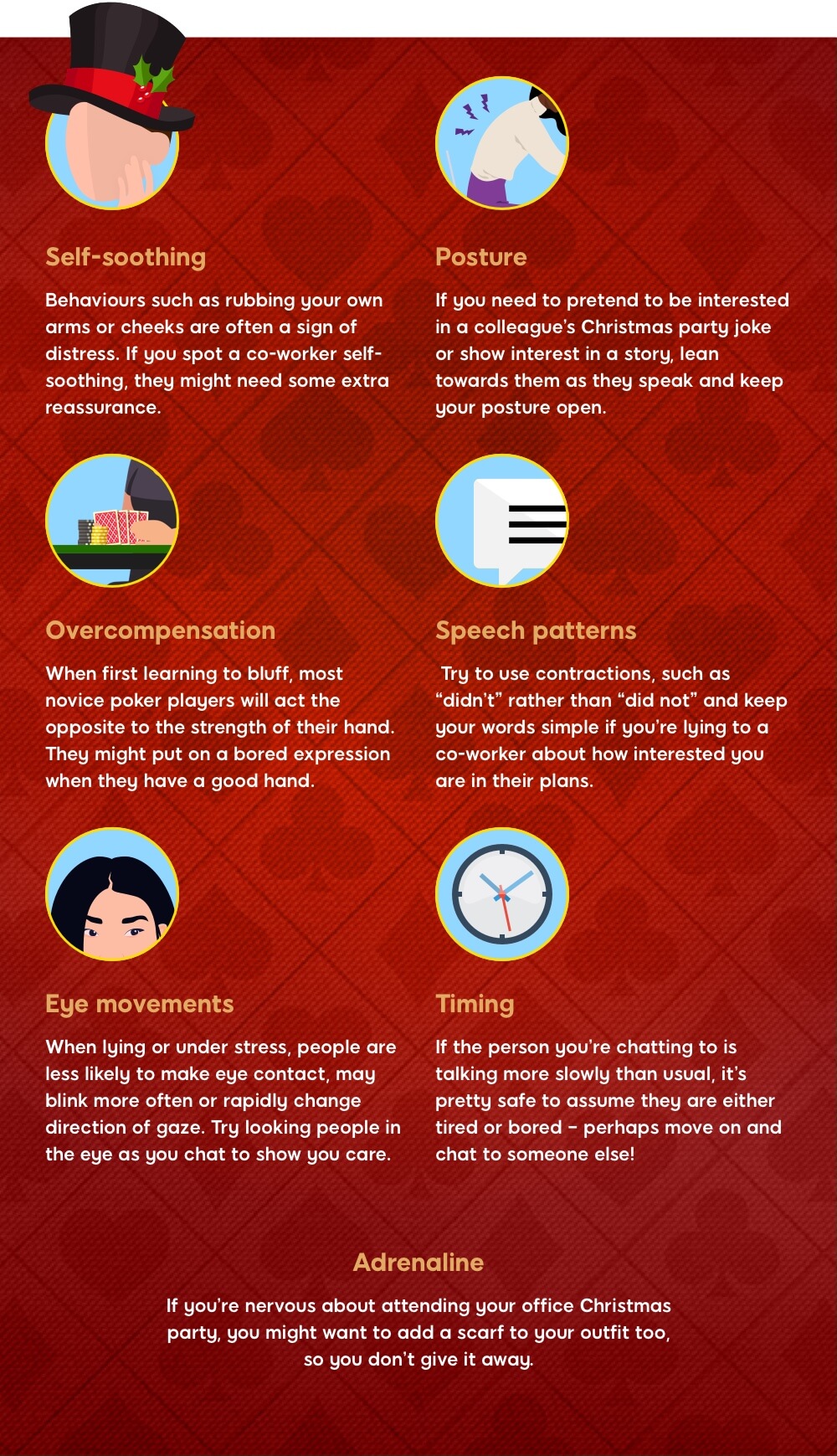
Ian Simpson says: “[Outside of poker, I’m most likely to bluff] when dealing with companies for sure. Whenever competitors want your business, you can say you've been offered a better price by someone else in your negotiating to help you get a better deal.”
When dealing with work colleagues, and particularly your boss, bluffing could help you negotiate better working conditions or even a better salary. You might even be able to use the art of bluffing to negotiate better deals on your Christmas shopping!
Whatever your plans are for the Christmas holidays, the chances are you will need to bluff on occasion. Whether that’s telling your mother-in-law that you love her Christmas jumper, pretending the turkey isn’t dry, or being sociable with people you would really rather avoid until the office opens again in January – when you practice the art of bluffing, you can not only improve your poker skills, but perhaps also get through the festive season without being the one that starts the annual family row!
Resources:
https://time.com/5443204/signs-lying-body-language-experts/
https://www.insider.com/how-to-be-a-good-liar-2018-3#dont-say-i-dont-lie-8
https://pokerpower.com/7-poker-tells-and-how-to-use-everyday-life/
